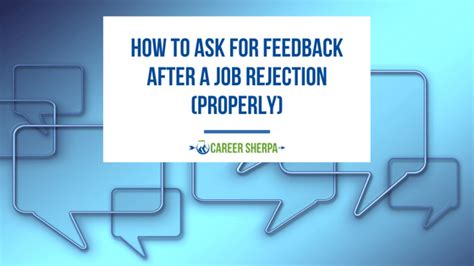The Job Seeker's Guide to Post-Rejection Feedback
Job hunting is a marathon, not a sprint. Rejection is an inevitable part of the process, but it doesn't have to be demoralizing. In fact, thoughtful post-rejection feedback can be invaluable for improving your job search strategy and boosting your chances of landing your dream role. This guide will equip you with the strategies and insights to navigate rejection constructively, turning setbacks into stepping stones to success.
Why Should You Ask for Feedback After a Job Rejection?
Many job seekers shy away from asking for feedback after a rejection, fearing further disappointment or feeling it's pointless. However, proactively requesting feedback demonstrates your professionalism, maturity, and genuine interest in self-improvement. The insights gained can illuminate areas needing improvement, refine your approach, and ultimately increase your future success rate.
How to Ask for Post-Rejection Feedback
The best time to ask is shortly after receiving the rejection notification. A simple, polite email expressing your continued interest and politely requesting feedback is usually sufficient. For example:
"Dear [Hiring Manager Name],
Thank you for taking the time to consider my application for the [Job Title] position. While I understand my application wasn't successful this time, I would greatly appreciate any feedback you could offer on my application or interview performance. This would be invaluable as I continue my job search.
Sincerely,
[Your Name]"
What to Do With the Feedback You Receive
Once you receive feedback (not all companies will provide it), carefully analyze it. Don't take it personally; instead, focus on identifying actionable steps. Feedback might highlight areas such as:
- Resume/Cover Letter Issues: Was your resume lacking specific keywords? Was your cover letter too generic? Did you adequately showcase your accomplishments and skills?
- Interview Performance: Did you answer questions effectively? Was your body language and communication style appropriate? Did you clearly articulate your qualifications and experience?
- Skills Gap: Did the feedback highlight any skills gaps compared to ideal candidates? This might point to areas for further training or development.
- Cultural Fit: Sometimes, a candidate might not be a good fit for the company culture. This is less about skill and more about personality and working style.
What If You Don't Receive Feedback?
Don't despair if you don't receive feedback. Many companies don't have the resources or processes in place to provide it. In this instance, consider reflecting on your own application and interview performance. Ask yourself the same questions listed above. Seek out a mentor or career counselor to provide an objective assessment.
Turning Rejection into a Learning Opportunity
The most important takeaway is to view rejections as learning opportunities, not personal failures. Each rejection brings you closer to understanding what works and what doesn't in your job search. Track your applications, the feedback received (or self-assessments), and adjust your approach accordingly. This iterative process will significantly improve your future prospects.
How Can I Improve My Interview Skills Based on Feedback?
If the feedback points towards shortcomings in your interview performance, focus on enhancing your skills in these areas:
- Practicing your responses: Prepare answers to common interview questions, focusing on the STAR method (Situation, Task, Action, Result).
- Improving your communication: Work on your articulation, body language, and active listening skills. Consider practicing mock interviews with friends or career counselors.
- Researching companies: Thoroughly research the company and role before each interview to demonstrate genuine interest and ask insightful questions.
What If the Feedback Is Vague or Unhelpful?
Sometimes, the feedback you receive might be vague or unhelpful. Don't let this discourage you. Even if the feedback isn't specific, you can still reflect on your application and interview, identifying areas for potential improvement.
How Can I Use Rejection to Improve My Resume and Cover Letter?
If the feedback points to resume or cover letter weaknesses, focus on these improvements:
- Tailoring your materials: Customize your resume and cover letter to each specific job application, highlighting relevant skills and experiences.
- Quantifying achievements: Use numbers and data to showcase your accomplishments and quantify your impact in previous roles.
- Keyword optimization: Incorporate relevant keywords from the job description into your resume and cover letter.
Conclusion: Embrace the Learning Curve
Navigating the job market requires resilience and a proactive approach to learning and improvement. Actively seeking and analyzing post-rejection feedback is a crucial step in transforming setbacks into valuable lessons. Remember, each rejection is an opportunity to refine your strategy and ultimately increase your chances of landing your ideal job. Embrace the learning curve, and you’ll significantly improve your job search success.

